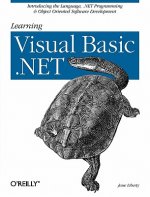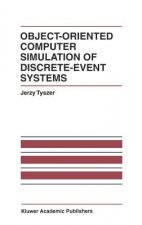
Kód: 01422250
Real-Time Management of Resource Allocation Systems
Autor Spyros A. Reveliotis
REAL-TIME MANAGEMENT OF RESOURCE ALLOCATION SYSTEMS focuses on the problem of managing the resource allocation taking place within the operational context of many contemporary technological applications, including flexibly automat ... celý popis
- Jazyk:
 Angličtina
Angličtina - Väzba: Brožovaná
- Počet strán: 244
Nakladateľ: Springer-Verlag New York Inc., 2010
- Viac informácií o knihe

151.77 €

Skladom u dodávateľa v malom množstve
Odosielame za 12 - 15 dní
Potrebujete viac kusov?Ak máte záujem o viac kusov, preverte, prosím, najprv dostupnosť titulu na našej zákazníckej podpore.
Pridať medzi želanie
Mohlo by sa vám tiež páčiť
-

Stochastic Calculus for Finance II
73.22 € -

12 Rules for Life
24.61 € -22 % -

Scandi Christmas
14.39 € -23 % -

Colour Quest (R) Animals
14.39 € -23 % -

Wimpy Kid Movie Diary
12.86 € -24 % -

Oxford International Primary History: Student Book 6
32.67 € -

You Are a Badass at Making Money
10.92 € -24 % -

Places I've Cried in Public
8.37 € -24 % -

At Satan's Altar: A Collection of Prayers, Chants, Affirmations, Hymns, and Rituals
19.40 € -

Fence Vol. 3
12.25 € -23 % -

My Little Pony: The Pony Games Activity Book- Ladybird Readers Level 4
5.20 € -

Dungeons & Dragons Spellbook Cards: Magic Items (D&d Accessory)
37.99 € -

Origami Paper 500 sheets Japanese Washi Patterns 6
14.19 € -2 % -

Great British Sewing Bee: Sustainable Style
27.36 € -23 % -

When No One Is Watching
11.12 € -23 % -

Draw Like an Artist: 100 Buildings and Architectural Forms
16.13 € -21 % -

Disney Songs for Kids - Easy Piano Songbook
17.56 € -3 % -

Tomb Raider - The Official Cookbook and Travel Guide
26.34 € -9 % -

NFTs For Dummies
21.75 € -19 % -

Bluey: Grannies
7.55 € -21 % -

Abandoned Empress, Vol. 1 (comic)
21.54 € -

Divine Invasion
17.56 € -14 % -

History of Sumatra
108.56 € -

Made in India
27.36 € -23 % -

U-Boat Owners' Workshop Manual
32.67 € -23 % -

Creative Haven Wondrous Nature Mandalas
6.73 € -19 % -

Star Wars: Legacy of the Force II - Bloodlines
12.25 € -23 % -

Ansel Adams in the National Parks
36.04 € -20 % -

Complete Dramatic Works of Samuel Beckett
19.91 € -22 % -

Learning Visual Basic .NET
28.59 € -21 % -

Swimming Anatomy
26.95 € -7 % -

Comprehensible Guide to Controller Area Network
17.15 € -19 % -

Improve Your Handwriting
12.25 € -23 % -

Be More Chill
7.96 € -24 % -

Little Book of Big Brain Games
11.74 € -6 % -

Rise and Fall of Ancient Egypt
18.68 € -23 % -

Mad Max: Fury Road
12.66 € -23 % -

Book of Salsa
45.65 € -

Rethinking Prestige Branding
42.99 € -

The Advantage
24.40 € -18 % -

GTO - Great Teacher Onizuka 02
15.72 € -

Chenilles d'Europe. Les chenilles de 500 espèces de papillons sur 165 plantes hôtes
41.66 €
Darčekový poukaz: Radosť zaručená
- Darujte poukaz v ľubovoľnej hodnote, a my sa postaráme o zvyšok.
- Poukaz sa vzťahuje na všetky produkty v našej ponuke.
- Elektronický poukaz si vytlačíte z e-mailu a môžete ho ihneď darovať.
- Platnosť poukazu je 12 mesiacov od dátumu vystavenia.
Viac informácií o knihe Real-Time Management of Resource Allocation Systems
Nákupom získate 376 bodov
 Anotácia knihy
Anotácia knihy
REAL-TIME MANAGEMENT OF RESOURCE ALLOCATION SYSTEMS focuses on the problem of managing the resource allocation taking place within the operational context of many contemporary technological applications, including flexibly automated production systems, automated railway and/or monorail transportation systems, electronic workflow management systems, and business transaction supporting systems. A distinct trait of all these applications is that they limit the role of the human element to remote high-level supervision, while placing the burden of the real-time monitoring and coordination of the ongoing activity upon a computerized control system. Hence, any applicable control paradigm must address not only the issues of throughput maximization, work-in-process inventory reduction, and delay and cost minimization, that have been the typical concerns for past studies on resource allocation, but it must also guarantee the operational correctness and the behavioral consistency of the underlying automated system. The resulting problem is rather novel for the developers of these systems, since, in the past, many of its facets were left to the jurisdiction of the present human intelligence. It is also complex, due to the high levels of choice otherwise known as flexibility inherent in the operation of these environments.§This book proposes a control paradigm that offers a comprehensive and integrated solution to, both, the behavioral / logical and the performance-oriented control problems underlying the management of the resource allocation taking place in the aforementioned highly automated technological applications. Building upon a series of fairly recent results from Discrete Event Systems theory, the proposed paradigm is distinguished by: (i) its robustness to the experienced stochasticities and operational contingencies; (ii) its scalability to the large-scale nature of the target technological applications; and (iii) its operational efficiency. These three properties are supported through the adoption of a "closed-loop" structure for the proposed control scheme, and also, through a pertinent decomposition of the overall control function to a logical and a performance-oriented controller for the underlying resource allocation. REAL-TIME MANAGEMENT OF RESOURCE ALLOCATION SYSTEMS provides a rigorous study of the control problems addressed by each of these two controllers, and of their integration to a unified control function. A notion of optimal control is formulated for each of these problems, but it turns out that the corresponding optimal policies are computationally intractable. Hence, a large part of the book is devoted to the development of effective and computationally efficient approximations for these optimal control policies, especially for those that correspond to the more novel logical control problem.Real-Time Management of Resource Allocation Systems focuses on the problem of managing the resource allocation taking place within the operational context of many contemporary technological applications, including flexibly automated production systems, automated railway and/or monorail transportation systems, electronic workflow management systems, and business transaction supporting systems. A distinct trait of all these applications is that they limit the role of the human element to remote high-level supervision, while placing the burden of the real-time monitoring and coordination of the ongoing activity upon a computerized control system. Hence, any applicable control paradigm must address not only the issues of throughput maximization, work-in-process inventory reduction, and delay and cost minimization, that have been the typical concerns for past studies on resource allocation, but it must also guarantee the operational correctness and the behavioral consistency of the underlying automated system. The resulting problem is rather novel for the developers of these systems, since, in the past, many of its facets were left to the jurisdiction of the present human intelligence. It is also complex, due to the high levels of choice otherwise known as flexibility inherent in the operation of these environments.
 Parametre knihy
Parametre knihy
Zaradenie knihy Knihy po anglicky Reference, information & interdisciplinary subjects Research & information: general Information theory
151.77 €
- Celý názov: Real-Time Management of Resource Allocation Systems
- Podnázov: A Discrete Event Systems Approach
- Autor: Spyros A. Reveliotis
- Jazyk:
 Angličtina
Angličtina - Väzba: Brožovaná
- Počet strán: 244
- EAN: 9781441936738
- ISBN: 1441936734
- ID: 01422250
- Nakladateľ: Springer-Verlag New York Inc.
- Hmotnosť: 397 g
- Rozmery: 14 × 155 × 15 mm
- Dátum vydania: 28. October 2010
Obľúbené z iného súdka
-

The Black Swan
11.23 € -22 % -

Human Use Of Human Beings
12.96 € -21 % -

Problems of Life
17.25 € -

Introduction to Systems Theory
26.34 € -3 % -

Linked
22.36 € -

Computer and the Brain
16.84 € -20 % -

Deep Simplicity
12.66 € -20 % -

Elements of Information Theory
137.06 € -

Sync
12.25 € -23 % -

Nonlinear Dynamics and Chaos
94.67 € -

Introducing Chaos
10.10 € -22 % -

System Identification
132.87 € -

Information Theory
30.84 € -

God & Golem, Inc.
50.45 € -

Ant Colony Optimization
10.31 € -12 % -

Recursive Universe
14.70 € -19 % -

Repair
37.47 € -3 % -

Ethics of Information
45.34 € -

Bioinformatics: An Introduction
139.21 € -

Systems and Models. Complexity, Dynamics, Evolution, Sustainability
28.08 € -

System Identification 2e - A Frequency Domain Approach
182.92 € -

General Systems Theory: Problems, Perspectives, Practice
147.99 € -

Modeling Business Processes
64.75 € -11 % -

Social Life of Information
35.02 € -

System Identification, Environmental Modelling, and Control System Design
214.07 € -

Fault Tolerant Control Design for Hybrid Systems
139.21 € -

Riccati Equation
151.77 € -

Object-Oriented Computer Simulation of Discrete-Event Systems
313.86 € -

Object-Oriented Computer Simulation of Discrete-Event Systems
313.86 € -

Cybernetics or Control and Communication in the Animal and the Machine
63.42 € -

Computational Beauty of Nature
78.94 € -2 % -

Optimal Control Theory
34.62 € -4 % -

Entropy Demystified: The Second Law Reduced To Plain Common Sense
38.60 € -

Student's Guide to Coding and Information Theory
44.32 € -

Introduction to Complex Systems
151.77 € -

On Dialogue
179.24 € -

Design Structure Matrix Methods and Applications
66.58 € -1 % -

Selected Works of Joseph E. Stiglitz
294.66 € -

Mathematical Systems Theory
70.67 € -

Plan Prediction
139.21 € -

Introduction to Evolutionary Algorithms
251.56 € -

Introduction to Cybernetics
18.89 € -

Randomness Through Computation: Some Answers, More Questions
202.02 € -

Brownian Motion, Martingales, and Stochastic Calculus
89.36 € -

Quantum Information Theory
99.37 € -

Seneca Effect
126.74 € -

New Advances on Chaotic Intermittency and its Applications
139.21 € -

Metaphysics of Virtual Reality
51.88 € -

Multiplicity of Time Scales in Complex Systems
179.24 €
Osobný odber Bratislava a 2642 dalších
Copyright ©2008-24 najlacnejsie-knihy.sk Všetky práva vyhradenéSúkromieCookies


 21 miliónov titulov
21 miliónov titulov Vrátenie do mesiaca
Vrátenie do mesiaca 02/210 210 99 (8-15.30h)
02/210 210 99 (8-15.30h)